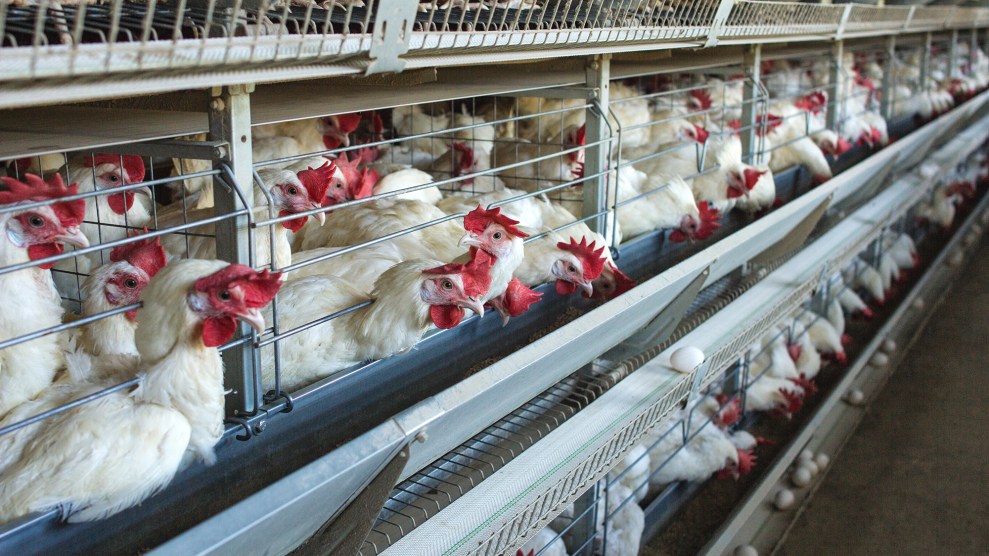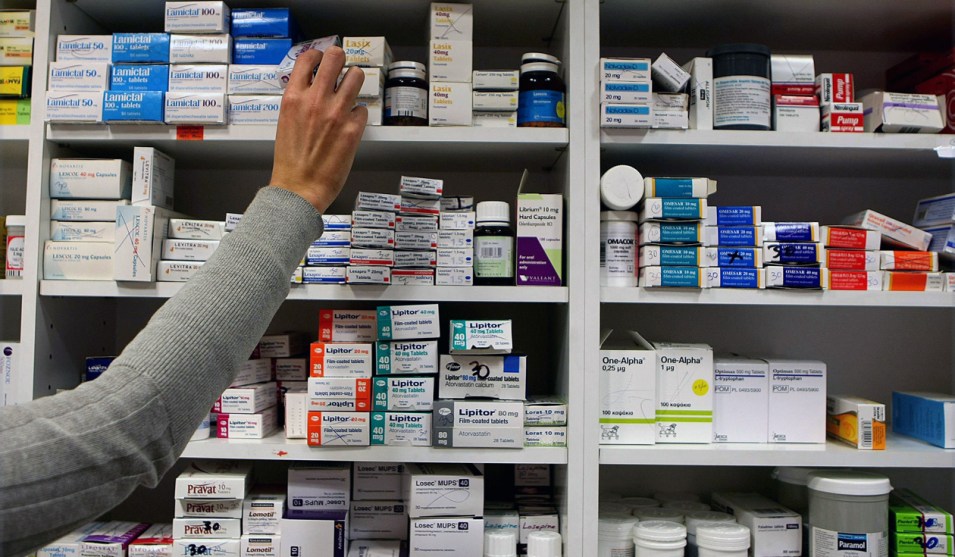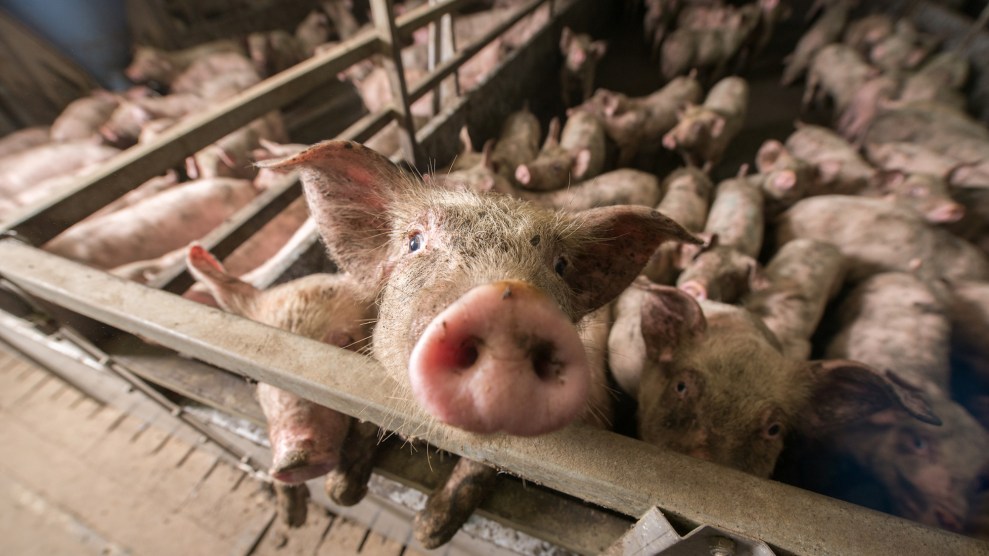
Henadzi Pechan/Getty Images
This story was originally published by Wired and is reproduced here as part of the Climate Desk collaboration.
New federal data released Tuesday shows that efforts in the United States to reduce unnecessary antibiotic use in livestock—a persistent generator of drug-resistant superbugs that can harm human health—have lost momentum, five years after the Obama administration imposed long-awaited rules to control misuse.
The US Food and Drug Administration’s 2020 report on sales of antibiotics for use in cattle, swine, and poultry—which include many classes of antibiotics also used in human medicine—shows that a sharp drop in sales in 2016 and 2017 stalled out in 2018, moving just a few percentage points up and down since. All told, sales of what the agency calls “medically important” antibiotics totaled 6 million kilograms (13.23 million pounds) in 2020, a 3 percent dip from the previous year and 8 percent higher than the 5.55 million-kilogram (12.25 million pounds) low point in 2017.
The data comes from an FDA document cumbersomely titled the “Summary Report on Antimicrobials Sold or Distributed for Use in Food-Producing Animals,” commonly known as the ADUFA Report (for its enabling legislation, the Animal Drug User Fee Act). It has been published every December since 2009, part of a deal struck during the Obama administration as the first step in a long reform program aimed at changing the way livestock is raised.
Meanwhile, an analysis that matches the first 10 years of those reports with parallel sales data for human medications—gathered not by the FDA but by the private sector—shows that antibiotic use in people has been stable for more than a decade. The analysis, released in November by two science-focused nonprofits, the Natural Resources Defense Council and the Center for Disease Dynamics, Economics and Policy, shows that sales for animal use are twice as high as those for people. In 2019, the year their analysis stopped, animals accounted for 65.3 percent of medically important antibiotics sold.
That is an extraordinary proportion, given that most antibiotics used in animal agriculture are not administered to cure infections—which is what antibiotics are for—but instead as a form of insurance, for preventing infections in crowded feedlots and barns.
Researchers working on the topic are dismayed that farm antibiotic use has not been forced down further. Almost no one, though, seems surprised. They say those Obama-era rules—which outlawed using tiny doses of antibiotics known as growth promoters, used to speed up weight gain—were never adequate. If the US is ever going to make significant progress in curbing animal antibiotic use and the superbugs that flow from it, tougher action is needed.
“We need the FDA to step up,” says Matthew Wellington, the public health campaigns director for the US Public Interest Research Group, which leads a coalition that pressures big restaurant chains to buy meat raised without antibiotic overuse. “When they made their initial regulations around growth promotion use, we told them that’s not going to be enough: You have to completely eliminate routine use of antibiotics, and make sure that the drugs are only used to treat sick animals in very limited circumstances.”
That’s a big ask, but there’s evidence that it’s possible. The European Medicines Agency announced last month that, between 2011 and 2020, farmers in the European Union cut antibiotic use by 43 percent. The bloc outlawed growth promoters in 2005, and is set to enact a ban next year on giving antibiotics to livestock to prevent future infections. That would restrict European farms to only using antibiotics to treat sick animals—the way we use antibiotics in people and, according to researchers, the only way that balances the benefit of a cure against the risk of provoking resistance. Cutting use on US farms down to that stringent EU standard is a long-sought goal, but given the new FDA data it may be out of reach.
Maybe a little context is in order. It’s been clear since the 1940s that resistance—which, broadly speaking, describes mutations that allow pathogens to defuse drugs’ attacks on them—arises whenever antibiotics are used. It’s evolution in action: If you expose an organism to something potentially lethal, but you don’t kill it outright, it can develop defenses to protect itself the next time.
Resistant bacteria have gotten very good at defending themselves: Each year, they kill an estimated 700,000 people around the globe, according to the World Bank, a number that has been predicted to rise to 10 million by 2050. Estimates of annual US deaths range from almost 49,000 people to more than 162,000, plus 2.8 million nonlethal infections. (The World Health Organization’s most recent global report identifies approximately 3 million infections per year globally, but that is considered a vast undercount, as it includes only 70 nations whose surveillance systems are up to the task.) Even during the Covid pandemic, the WHO called resistance “one of the biggest threats to global health, food security, and development” worldwide.
Because the volume of antibiotics given to farm animals outstrips what is used in humans, that makes agriculture a petri dish for breeding resistant bacteria; hundreds of studies have shown a clear connection. Those bombproof pathogens harm livestock, cut into farm productivity, and sicken people, crossing to us via meat and manure and through the environment. It’s also clear that when farmers stop using so many antibiotics, the incidence of resistant bacteria diminishes. In just one example, the Canadian government mandated cuts in farm antibiotic use in 2014, and by 2019 resistant food-borne bacteria dropped by 38 percent.
The connection between farm antibiotic use and human illness was established in the 1970s, and for just about that long, the FDA attempted unsuccessfully to control the practice. (Its first bold attempt in 1977—when it tried to take away pharma companies’ licenses to make farm antibiotics—was foiled by members of Congress from agricultural states who threatened to retaliate by holding up the agency’s entire budget.)
Finally, in 2015, the Obama White House created a national strategy for combating antibiotic-resistant bacteria, including in agriculture. And on January 3, 2017, two weeks before Obama left office, the FDA locked in its prohibition on growth promoters, in a rule titled “Guidance for Industry #213.” That rule made growth-promoting doses illegal, and required that any other antibiotic use be approved by a veterinarian. But it left big holes in controlling farm antibiotic use: The rule allowed some to be purchased over the counter, didn’t set any limits on how long drugs could be used, and permitted routine preventive use to dose entire flocks or herds.
That was thought to be the best the US could do, especially with the pro-business Trump administration about to take over. But researchers knew in advance that a growth promoter ban would be inadequate. They already had an example of why it wouldn’t work: A few years earlier, the government of the Netherlands had noticed that, despite the EU ban in 2006, sales of antibiotics to Dutch farms kept rising. An investigation by academics working with regulatory agencies revealed that companies selling ag antibiotics in the Netherlands had changed the labeling on growth promoters to “preventative use” to circumvent the new law.
That seems to be what has happened in the US. One means of using antibiotics was made illegal, so producers found a different path. “There was a huge increase in ‘therapeutic’ use right after the elimination of growth promotion,” says Lance Price, a microbiologist and professor at the George Washington University’s Milken Institute School of Public Health and founding director of its Antibiotic Resistance Action Center. “It was a perfect parallel to what happened in the Netherlands, where they just changed what they called it.”
The new federal data does hold one bright spot. The 2020 report reveals that of all the antibiotics sold for agricultural use, raising chickens—the most commonly consumed meat in the US—accounts for only 2 percent of the drugs. That’s compared to 41 percent each for cattle and hogs, and 12 percent for turkeys. It represents a complete turnaround for the US chicken industry that began in 2014, when Perdue Foods, then the nation’s fourth-largest producer, announced it was taking its entire operation antibiotic-free.
“Only 1 percent of broiler chickens in the US are produced with what the industry calls ‘full-spectrum antibiotics,’” Wellington says. “And more than half are raised ‘No Antibiotics Ever.’ That’s incredible. But it means that we’re at a standstill with pig and cattle production.”
In 2018, the year after the growth-promoter ban went into effect, the FDA announced it was launching a 5-year plan to further regulate farm antibiotics. But progress has been slow. In June, the agency introduced new rules that would reclassify those remaining over-the-counter drugs—a small number of injectable and topical antibiotics—as prescription-only.
Activists are impatient for the agency to do more. An open letter by researchers published earlier this year, asking the Biden administration for big sweeping actions, did not provoke any response. So advocates are focusing on smaller changes that they feel are reasonable for the FDA to make: more regulation, especially on how long antibiotics can be used in any single animal or herd, and more data-gathering that would allow better insight into how antibiotics are being misused. Annual reporting that tracks resistance rates in bacteria taken from humans and animals, and matches it to both sales and use data, is routine in the EU. In the US, no such comprehensive reports exist.
“First, if the FDA had actually done what it proposed in 2017, we would know more—that is, instead of just reporting sales, report sales with a denominator that reflects the size of the animal population,” says David Wallinga, a physician and senior officer at NRDC and coauthor of the analysis of FDA data. “That’s what they’ve been doing in Europe since 2010. And the second thing is to actually collect data at the farm level on antibiotic use.”
It’s urgent to keep forcing down antibiotic use, because research increasingly is showing how far-reaching the influence of farm antibiotics may be. It’s been clear for a year that resistant infections are affecting people being treated for Covid and also increasing the stress on overwhelmed hospitals; scientists believe some of those infections, particularly resistant fungi, emerged because of agricultural antibiotics. Research published in September shows that when farm antibiotics get into soil, from direct dispersion or via manure, they interfere with microbial communities and reduce carbon storage.
And for five years now, a team based primarily at the Ohio State University has been piecing together a complex cycling of resistance that flows back and forth through farms, hospitals, and sewage, affected by both ag and medical antibiotics and posing hazards in both places. Their research started with the shocking discovery that resistance to a medical last-resort antibiotic, one not used in agriculture, could be isolated from swine on a farm. They then showed the same resistant bacteria, known broadly as CREs, slipping past treatment in sewage plants and flowing through US waterways, including toward livestock farms.
Most recently they found—though this part is only lab work, so far—that when those bacteria bearing last-resort resistance slip onto farms, the inexpensive old antibiotics already used on animals can help those most dangerous bacteria flourish, by changing the dynamics of a mixed-microbe population in ways that favors their survival.
It’s all one cycle, in other words. “One of the big things to investigate right now is environmental dissemination of high-consequence, antibiotic-resistant bacteria,” according to Thomas Wittum, who leads that research project and is a professor and chair of veterinary preventive medicine at Ohio State. He describes a continuous flow of the genetic material that confers resistance to antibiotics, spiraling from hospitals to sewage to farms to the environment to households and pets and then back to hospitals again—and the need to interrupt that cycle at any available point.
Reducing farm antibiotic use would be one way to put the brakes on. But the data in the FDA report suggests that won’t be happening soon.













